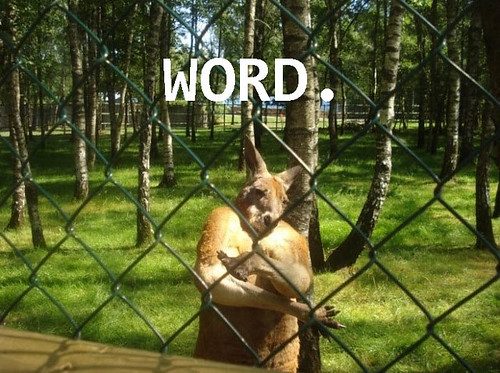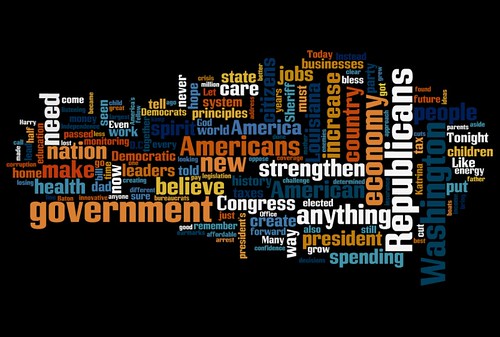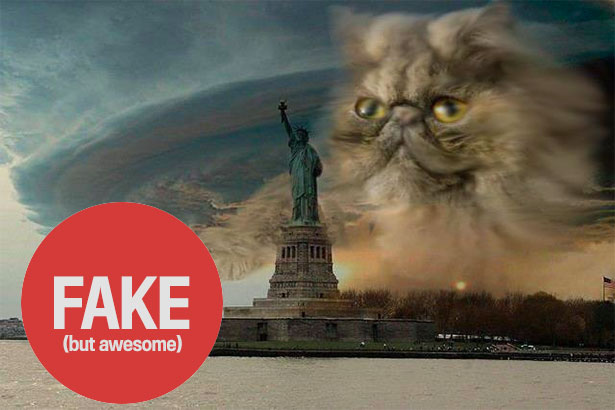Earlier this week we shared our favorite TV words of 2012. Today, we present to you our favorite language stories of the year.
Blah people
Rick Santorum kicked off 2012 with some comments about (cough) blah people. Mark Liberman took a closer look.
Apostrophe catastrophe!
In slightly less controversial news, the United Kingdom’s “largest high street bookseller,” Waterstone’s, decided to forgo an apostrophe and become Waterstones. Stan Carey deemed the decision “reasonable” and rounded up some great reactions. At Language Log, Mark Liberman poked fun at this “apostropocalypse,” while Geoff Pullum clarified some muddled apostrophe arguments and wondered about the apostrophe and sound.
Lin-sane linguistics
February was all about Jeremy Lin and the linguistics of Lin-sanity, as Ben Zimmer put it. The American Dialect Society went as far as to deem Linsanity a possible contender for 2012 word of the year, but after Lin fell out of the spotlight, it seemed Linsanity, though not Lin’s career, was over, at least for finicky linguists.
The other four-letter word
Conservative talk-show host Rush Limbaugh celebrated the leap year by calling law student and women’s right activist Sandra Fluke a “slut,” then faux-pologizing for it. Johnson examined Limbaugh’s onomatapology while at NPR, Geoff Nunberg took a look that four-letter word in question.
Passings
We were saddened by the passing of several great authors this year, including Helen Gurley Brown, Maeve Binchy, Nora Ephron, Adrienne Rich, Encyclopedia Brown author Donald Sobol, Ray Bradbury, Berenstain Bears co-creator Jan Berenstain, and beloved children’s author Maurice Sendak. Some delightful interviews from The Colbert Report helped us miss Sendak a little less (part 1, part 2, and the uncensored outtakes).
See here for more notable author passings.
English language wars and anti-Americanisms
As the weather warmed, an English language war heated up between a couple of New Yorker prescriptivists and, it seemed, all the descriptivists, including Ben Zimmer, Nancy Friedman, Christopher Shea at The Wall Street Journal, Ben Trawick-Smith at Dialect Blog, and Johnson at The Economist.
Later, September saw some (unnecessary, we thought) anti-Americanisms. But luckily, Stan Carey and Robert Lane Greene had a thing or two to say about that.
Jubilympics and brand police
June was a big month for London with both the Diamond Jubilee and the Olympics (hence, Jubilympics). Meanwhile, the brand police were busy making sure ambush marketers didn’t get too olympic about their advertising.
Higgs boson metaphors
In early July, scientists found a new subatomic particle, the Higgs boson, as “imagined and named half a century ago by theoretical physicist Peter Higgs.” What this means, probably only other theoretical physicists know, but at least we got lots of Higgs boson metaphors, including the smoking duck variety.
The modesty of The New York Times
The New York Times failed in taboo avoidance when they described the noun cocksuckers as “Offensive Adjective Inappropriate for Family Newspaper.” As Arnold Zwicky wrote, “Adjective, noun, who really cares?” The NYT then refused to print the name of the website, STFU Parents, resulting in STFU-gate, which Zwicky also discussed, along with the seemingly new NYT modesty.
Stormy words
October closed with superstorm Sandy wreaking havoc on Cuba, Haiti, and much of the U.S. northeast. At The Atlantic, Alexis Madrigal helped us sort the fake Sandy pictures from the real, while Jen Doll provided a dictionary of storm words.
The language of politics
The latter half of 2012 was dominated by the U.S. Presidential election. The campaign team of Republican presidential nominee, Mitt Romney, made some spelling errors. A new meme was born out of the Republican National Convention.
After the Vice Presidential debates, we got a lot of malarkey, my friend, from Ben Zimmer, Jen Doll, and Nancy Friedman, as well as a sketchy deal, binders and barb words, binders full of women, and binder reviews. Meanwhile, after the Presidential debate, President Obama came up with a wit of the staircase, and later coined a new disorder.
We also learned where red states and blue states come from; the semantics of voting and standing in (or is it “on”?) line; a razor-tight mixed metaphor; and the We are all the X now trope.
“Lies! Murder! Lexicography!”
Finally, the headline of Ben Zimmer’s piece in The New York Times sums up the last big language story of the year. A former Oxford English Dictionary editor deleted a bunch of words and it was terrible, but no, not really. We mean, really not really.
Whew, that’s 2012 in a language blog nutshell. See you next year!



